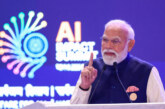
Dr. Arvind Kumar*

Whether it’s the effects of climate change or deforestation, our planet is facing some of the biggest challenges generations has ever known. Many climate-related records have been broken by enormous margins in 2023 and as temperatures are creeping up, climate-related disasters are leaping up. Even more concerning is that many of these disasters are hitting communities that have historically produced very little carbon pollution. Humans will not be the only ones to suffer in a warming world. After all, we share the planet with around nine million species of plants and animals. As ecosystems falter, species large and small will come increasingly under strain, and will need to adapt or perish. Many will go extinct, whereupon it will take millions of years for Earth to recover its breadth and depth of biodiversity. With the planet fundamentally and irreversibly changed, the implications for humanity itself would be immediate and far-reaching. The devastating effects of biodiversity loss are likely to continue to plague the planet for millions of years. “The Sixth Extinction” is another name for the current extinction of biodiversity.
With the world’s population tripled in the past 60 years has strained the environment due to increased land development and urbanization. Rapid population growth leads to increased demand for food, water, and energy. According to a lot of experts, water will soon start to trade like gold and oil. Wars will be fought over who controls the water supply, according to some experts. Currently, one-third of all people do not have adequate access to fresh, clean water. The figure is expected to increase by up to two-thirds by 2050. That is, there won’t be clean water available to two-thirds of the world’s population! Overpopulation, excessive demand, and industrial pollution are to blame. Human waste that is in the form of plastic frequently finds its way into the ocean. Pollution-related illnesses escalate, leading to respiratory diseases, cancers, and reduced life expectancy.
When ecosystems are compromised, the natural goods that they provide – clean air and water, crop pollination, and storm protection – inevitably will decline. Studies show that declining access to clean water and intensifying storms and droughts related to climate change could displace 100 million people just in the next 30 years. The world is at a crossroads. The future of life on our planet – and thus our own – is in jeopardy. The overall picture of Earth’s health is grim.
But will just talking about these challenges is going to make things better? Our very future depends on rising to the challenge so what are the solutions?
Our Efforts Our Planet
Shouldn’t we question our leaders and policymakers during elections to renew commitment to protecting natural and democratic heritage, protection of ecosystems, and inclusion of community and civil society as central in all local and national development decision-making. Each political candidate offers a unique stance on climate policy, and their level of commitment to tackling global climate change varies markedly. The choices made by voters could therefore have substantial consequences in shaping our planet’s environmental future. Closer home in India as responsible citizens of a country it is our duty to think of the future of our democracy and people’s right to clean air and water security in the coming years as the country is facing extreme impacts of global warming, climate change, water crisis, scanty and unpredictable rainfall, melting glaciers, and increasing pollution and population both. The alarming levels of pollution in India are causing severe impacts on both the environment and the health of residents in its cities, marking it as a critical nationwide issue. Addressing this challenge should be a priority by actively seeking solutions to mitigate these detrimental effects.

Fortunately, we know what we need to do. When we put people at the center of sustainable growth, we can nourish humanity and build a stronger world by enabling collective action. We have to emphasize on exploring the opportunities of coordinated and integrated actions between environment sustainability and aim to do away with the ‘silo’ thinking between the inter-connected targets. Estimates suggest that nature-based solutions can provide 37% of the mitigation needed until 2030 to achieve the targets of the Paris Agreement. How can this be done? If you plant trees, they’re going to soak up carbon. For example, restoring native forest at the margins of the river to avoid landslides can also act as a carbon sink. Climate-smart agriculture is another example that enables farmers to retain more carbon in their fields as they produce crops. Decreasing deforestation is another way to benefit from nature-based solutions – for example, by paying farmers not to cut down the forest preserves ecosystem services such as carbon sequestration, provision of clean drinking water, and reduction of river sedimentation downstream.
Way Forward
We need a radical change in our relationship with the planet. What we need is a more systematic effort to address the three pillars of sustainable development at the same time – the economic, the social and the environmental. No country should have to choose between fighting poverty and fighting for the planet. One big pillar of this transition is moving towards a circular economy where the value of products, materials and resources is maintained in the economy for as long as possible, and the generation of waste minimized. If we implement this circularity in the correct way, it will lift people out of poverty. It can help address hunger, shorten supply chains, strengthen connections inside communities, while also creating green jobs. Overconsumption has been a key cause of the global climate change challenge. This needs a collective effort by starting to make conscious and environmentally friendly choices. This Earth Day let us make progress towards preserving this planet, the only home to humans and all species – the only one for the future generations to come- So ACT NOW!!
*Editor, Focus Global Reporter



